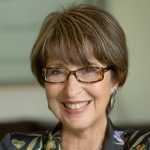This Contribute post/Forum Update was provided by Elisa Lanzi, Director of Digital Strategies and Services (@LanziElisa), Brendan O’Connell, Instructional Technology Librarian (@brendan0connell), and Jasmine Jones, Metadata and Technical Services Archivist (@jmjones27), at Smith College Libraries.
Elisa Lanzi, Director of Digital Strategies and Services

I had attended DLF for the past two years as the sole Smith College participant. This year it really made a difference to have the three of us focus on different parts of the program. We absorbed three times as much content! These two colleagues, Brendan O’Connell and Jasmine Jones, are joining me in this post (below).
After this year, I consider DLF my go-to conference. As Director of Digital Strategies and Services at a small college I deal with everything from hardware deployment to user experience to repositories. The mix of different sizes and types of schools at DLF provides that broad swath of experience applied to the increasingly complex entity we call the digital library.
When Cecily Walker (Assistant Manager for Community Digital Initiatives & eLearning at Vancouver Public Library) said, “interdisciplinary, not neutrality is desired” in libraries, it gave me a framework for thinking about our upcoming library renovation. “What does it mean to be doing work like this in this time?” asked her co-speaker, Chris Bourg (Director of Libraries at MIT). Their reflections were my take-aways as we at Smith engage in the process of re-imagining our library at a 21st century women’s college.
Brendan O’Connell, Instructional Technology Librarian

It’s perhaps too early (and maybe will always be too early) to define this community, but what features were on display during the preconference?
- A strong and crucial focus on involving undergraduates in every phase of building digital libraries and creating works of digital scholarship. One presentation title from the preconference says it best: “Beyond Grunt Work: Putting Students at the Center of Digital Scholarship”. In keeping with liberal arts colleges’ historical and present focus on undergraduates as creators of original scholarship, we shouldn’t be surprised that liberal arts college libraries are leading the way in this regard.
- A strong affinity with ethical librarianship and interest in libraries as sites of resistance and critique. Chris Bourg’s and Cecily Walker’s joint keynote addressed the ethical dimensions of our work, and how digital libraries can empower marginalized communities.
As an Instructional Technology Librarian at Smith, much of my work is focused on close collaboration with faculty on incorporating technology (broadly defined) into course design and how library resources can be leveraged to accomplish their pedagogical goals. On this level, I learned about lots and lots of cool tools that I’ll be sharing with my faculty, including Mirador, a powerful image comparison and annotation tool from Stanford that leverages the International Image Interoperability Framework.
More importantly, though, I continued to learn how to talk about tools and technology and incorporate discussions of the designed nature of digital systems with students and faculty. Safiya Umoja Noble’s keynote address, “Power, Privilege and the Imperative to Act”, presented her work on how Google’s search algorithms have reinforced existing racist and sexist representations of black women. In response, I would hope that our digital library community of practice and development can be a place where we continue to resist and critique mainstream digital design, but also to use our digital library skills to engage in creative action that develops alternatives to these systems.
Jasmines Jones, Metadata and Technical Services Archivist

As the first Metadata and Technical Services Archivist of the newly integrated Smith Special Collections, I think a lot about systems: our move from old to new; metadata wrangling and migration; the integration of the physical and digital; and streamlining processes, in order to develop program-based, rather than project-based, work. It might be no surprise, then, that I see metadata as one of the core functions of the work that we, as information professionals, do. I believe this sentiment, of metadata as a core function, was shared by those who participated in voting for the conference program, given the robust offerings of sessions about metadata. Metadata is one of the simplest ways that we can build relationships with our communities and facilitate access to our materials in a way that is thoughtful, meaningful, and inclusive. It’s the bridge to our communities, the bridge between systems, the bridge between collections, the bridge between legacy and the new. And because it is the bridge for so many things, we need to continue to be critical about how metadata is created, who is involved in the creation of it, and the standards that govern its creation. My take-away from DLF wasn’t any one tool or workflow, though the ones shared were awesome; it was that we need to think, create, and work with intention and be mindful of the impact of our work on the communities that we serve.
